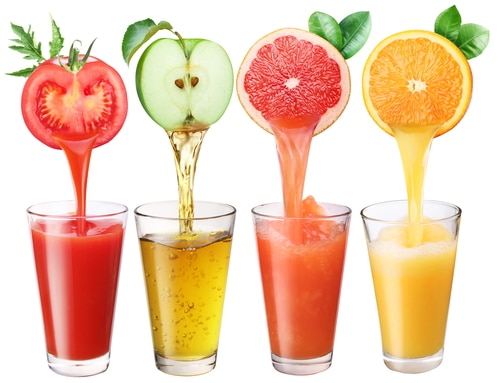
Juicing Pros and Cons
Undoubtedly the greatest benefit of juicing is it makes it easier to meet your fruit and vegetable quota for the day. That’s no small feat. Would you believe only one in four people eats three or more servings of vegetables a day? If you don’t like the taste of vegetables, juicing makes it easy to “hide” vegetables. You just juice some veggies and fruit and mix them together. The fruit disguises the veggies and you’re ready to drink up.
There are some downsides. When you juice fruits and vegetables you’re missing out on a good source of fiber. Fiber is heart-healthy and gut-friendly. Plus, it gives you a feeling of satiety. Liquids are not as satiating as solid food and the calories add up if you’re juicing a lot of fruit, not to mention the impact the natural sugars in the fruit have on your blood glucose and insulin levels. When you eat a piece of whole fruit, the natural fiber reduces the blood sugar and insulin response. You don’t get that when you drink juice.
Fresh Juice Isn’t Necessarily Low in Calories or Sugar
If you drink a significant amount of fruit juice, even without added sugar, the calories can add up. Because juice isn’t as filling, you’ll probably still eat roughly the same amount. That’s why juicing could work against you if you’re trying to lose weight. A cup of apple/carrot juice is a good source of vitamins and antioxidants, but a single 8-ounce serving has 240 calories and 50 grams of carbs. Wouldn’t it be better to enjoy a whole apple and carrot instead? You’ll consume fewer calories and carbs and feel fuller than you will drinking a cup of juice.
Did you know that much of a fruit or vegetable’s nutrients are in the skin and pulp? Most juicers remove the pulp and skin so you miss out on those nutrients and antioxidants. There are advantages to eating the whole fruit or vegetable rather than isolating out its juice.
Are Smoothies a Better Option?
Blending a smoothie at home in your blender may be a better option. When you make a smoothie, you can use the whole fruit – pulp, skin and all. That means you’ll get more fiber. Plus, it’s easier to disguise the taste of veggies you don’t enjoy when you’re adding yogurt along with fruit. You can easily turn a fruit and veggie smoothie into a balanced meal by adding a scoop of protein powder. The protein and fiber will help you stay full longer than sipping an equal amount of juice.
It’s quick and easy to whip up a tasty smoothie in a high-power blender using Greek yogurt and fruit along with a handful of kale or spinach for more cancer-fighting nutrients and antioxidants. You can even add flaxseed or almond butter for more heart-healthy fats. It’s more time consuming to juice fruits and vegetable and a good home juicer can be expensive.
The Worst Way to Approach Juicing
It’s become popular recently to go on “juice fasts” to lose weight. With these fasts, juice becomes a substitute for food for a few days or even up to a week for weight loss purposes. By juice fasting, you may lose a pound or two, mostly water weight and loss of glycogen, but you’ll quickly regain it. Fresh squeezed juices lack protein and healthy fats that your body needs for tissue repair and maintenance. Extend your juice fast out too long and your body will begin to break down muscle. Placing this type of stress on your body can also slow your metabolism, making it harder to lose weight.
Juice in Moderation
If you like the taste of fresh juice, enjoy it in moderation and as part of a balanced diet that includes a healthy balance of protein, carbs and fat, but don’t use it as a way to lose weight fast. Stick with juicing vegetables since they’re lower in natural sugars with the exception of some like beets, peas, potatoes, and corn. Even better, sip a fruit and veggie smoothie or bite into a piece of whole fruit instead and enjoy fresh produce as nature intended it.
References:
Mayo Clinic. “Is juicing healthier than eating whole fruits or vegetables?”
Related Articles By Cathe:
Juicing Your Way to Weight Loss: 5 Reasons It’s Not a Good Idea
Fruit Juice, Smoothies, and Whole Fruit: Is One More Nutritious Than the Other?

